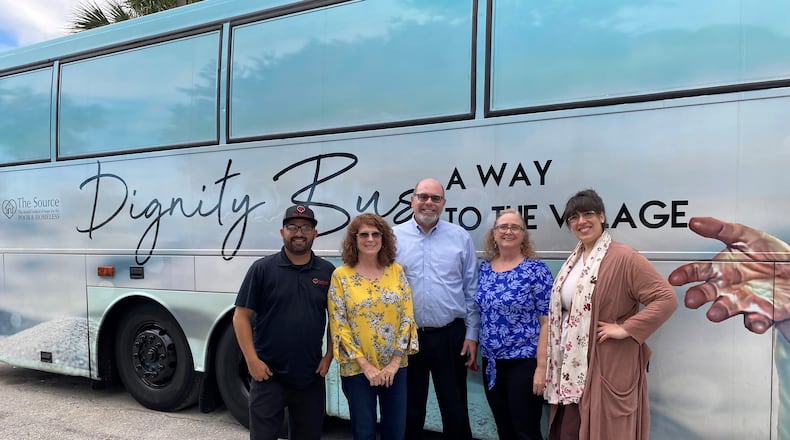Carpenter told the Journal-News the buses aren’t just vehicles — the Florida program also offers wrap-around services she says are a must-have.
“It’s complicated, the solutions are going to be complicated, the problems are complicated,” she said.
“It’s a pretty nifty operation but there are a lot of parts to it, I know the bus is kind of exciting but it doesn’t work because there’s a bus,” she said. “It works because of all the other wrap-around services. The bus is the place to sleep but it does, I think, get you over the hurdle of communities not wanting people to sleep in their community and not wanting agencies to build houses for the homeless.”
The Dignity Bus idea first surfaced in Middletown in August when the Coalition for a Healthy Middletown proposed the city spend $360,000 on three buses — one for men, another for women and one for overflow — that would provide the unhoused a nightly warm place to sleep during the winter.
The buses are specially-equipped with 20 sleeping pods, two toilets, personal lockers, luggage area and a place designated for pets.
Middletown Mayor Nicole Condrey told the Journal-News she doesn’t think the city will purchase the buses since the council has not indicated they would support it.
“The city is already spending a lot of time and money on the homeless... I don’t plan to support anymore funds to go toward that effort, our taxpayers have done enough,” she said.
Condrey said she would rather get to the cause since the police have told them many of the people they have interacted with are choosing to live on the streets.
“I like to look at the cause and I want to put effort into fixing the cause of it,” Condrey said. “We can put all the warming shelters up we want, but it’s not going to solve anything. How much do you spin your wheels and keep throwing dollars and time and money at the effect instead of solving the cause?”
Carpenter said she’s not ready to ask her fellow commissioners to buy Dignity Buses and undertake a similar program yet, because they would need a group or groups from the community to be willing to provide the wrap around services to help people get back on their feet.
“We will have to see if there is a proposal that can provide all those services,” Carpenter said. “But we may be able to get some people to take a look at the program.”
The Florida program, run by an organization called The Source, offers the Dignity Bus as well as emergency hunger relief, clothing, counseling, support groups, hygiene items, showers, mail and telephone services and benefit referrals, according to their website.
Diver told the Journal-News they have a meeting this week to discuss whether the buses are a good fit here and what role his agency might play. He said the Florida program relies heavily on the faith-based community to run the programming that includes providing jobs within the organization for the homeless.
“How much of that’s going to apply here, I just don’t know right now, because we’re set up differently,” Diver said. “Different environment, different funding streams.”
Carpenter chairs the local Stepping Up Initiative — a statewide effort launched about five years ago by retired Ohio Supreme Court Justice Evelyn Lundberg Stratton. It is a group charged with finding solutions to a wide range of problems including help for the homeless and services to help recovering addicts stay sober.
The group met via Zoom for three hours on Friday when they discussed the Dignity Buses and some other ideas. Carpenter reported the county has $3.1 million in American Rescue Plan Act HOME funding and the consultant’s report — a HUD requirement — to gauge housing needs countywide is ready.
The draft report “speaks in generalities about the need for affordable housing, priority housing for the homeless and the need to provide supportive services.” She said the next step is to convene an executive team of elected officials, city managers and their community development staff so “hopefully we will end up with a countywide plan for the most desperately needy individuals.”
She said what that group comes up with can serve as a guide for the commissioners when they annually allocate HOME Investment Partnerships Program money from the U.S. Department of Housing and Urban Development
Stratton, who was on the Zoom call, praised the participants on the meeting from Butler County for taking a comprehensive approach to the homeless problem.
“When you absolutely take care of them not only do you improve their lives, you save the county a lot of money and a lot of grief and changes that are just so beneficial,” Stratton said.
About the Author

